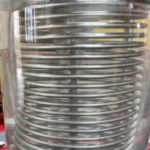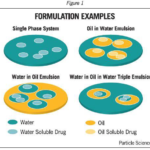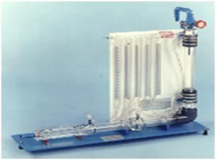Mixing Process by Stirring Model FM 96
Home » Products » Mixing Process by Stirring Model FM 96
Mixing Process by Stirring Model FM 96
During stirring, the continuous phase is liquid. With Sci-tech Mixing Process by Stirring Model FM 96 the production of solutions (solid dissolved in liquid), emulsions (mixture of immiscible liquids) and suspensions (insoluble solid in liquid) can be investigated.
Mixing takes place in a tank which is resistant to chemicals and heat-resistant. With the high-performance stirring machine even high-viscosity mixtures can be produced. The speed is adjustable. The torque is indicated on the unit’s digital display. This enables the power demand to be determined.
Nine different, easily interchangeable stirrers are provided. With plastic balls which are dispersed in the water it is possible to observe the characteristic flow fields of the different stirrer types. Flow impeders can be inserted in the tank to investigate their influence on the mixing process. To determine the mixing time and mix quality of solutions, a conductivity meter is available. The device can also be used to measure temperatures.
A removable coiled tube serves as a heat transfer medium. It can be used for heating or cooling with water from the laboratory supply. A valve with precise adjustment is used to adjust the flow rate. This enables the influence of mixing processes on heat transfer to be investigated.
| Size: | 60cm x 50cm x 80cm (LxWxH) |
| Weight: | 35 kg |
Item Description
Features
- Visualization of flow fields when using various stirrer types
- High-performance stirring machine with speed control
- Determination of mixing time of solutions
- Mixing of emulsions and suspensions
- Influence of mixing processes on heat transfer
- Power demand during stirring
During stirring, the continuous phase is liquid. With Sci-tech Mixing Process by Stirring Model FM 96 the production of solutions (solid dissolved in liquid), emulsions (mixture of immiscible liquids) and suspensions (insoluble solid in liquid) can be investigated.
Mixing takes place in a tank which is resistant to chemicals and heat-resistant. With the high-performance stirring machine even high-viscosity mixtures can be produced. The speed is adjustable. The torque is indicated on the unit’s digital display. This enables the power demand to be determined.
Nine different, easily interchangeable stirrers are provided. With plastic balls which are dispersed in the water it is possible to observe the characteristic flow fields of the different stirrer types. Flow impeders can be inserted in the tank to investigate their influence on the mixing process. To determine the mixing time and mix quality of solutions, a conductivity meter is available. The device can also be used to measure temperatures.
A removable coiled tube serves as a heat transfer medium. It can be used for heating or cooling with water from the laboratory supply. A valve with precise adjustment is used to adjust the flow rate. This enables the influence of mixing processes on heat transfer to be investigated.
- investigation of mixing processes during stirring
- transparent stirred tank with 4 removable flow impeders
- speed-controlled stirring machine with digital torque indicator
- 9 interchangeable stirrers: axial-, radial-, tangential-conveying
- removable coiled tube for cooling or heating with external water supply
- portable device for measuring conductivity and temperature
Technical Specifications
Specifications
1. investigation of mixing processes during stirring
2. transparent stirred tank with 4 removable flow impeders
3. speed-controlled stirring machine with digital torque indicator
4. 9 interchangeable stirrers: axial-, radial-, tangential-conveying
5. removable coiled tube for cooling or heating with external water supply
6. portable device for measuring conductivity and temperature
Technical Specifications
Stirred tank
capacity: approx. 20L
material: DURAN glass and PVDF (base)
Stirring machine
speed: 50…2000min-1
max. power output on shaft: 100W
Stirrers
5 propeller stirring heads
o 2x 3 blades, D=70mm / 100mm
o 1x 4 blades, D=70mm
o 2x 2 blades (angled), D=70mm / 100mm
3 paddle stirring heads
o 2x paddle: 70x70mm with 3 / 6 holes
o 1x paddle: 70x100mm with 10 holes
1 turbine stirrer with shaft: D=50mm
Coiled tube
diameter: approx. 140mm
material: stainless steel
Measuring ranges
conductivity: 0…200mS/cm
temperature: 0…85°C
speed: 50…2000min-1
Optional: ‘Sci-Cal’ Computer Control Software & Interface
‘Sci-Cal’ software & hardware has been designed for use with more than 600 ‘Sci-tech’ trainers. ‘Sci-Cal’ comes in a module that can be fitted or mounted on the Sci-tech trainers very easily.
‘Sci-Cal’ box has 11 inches front HMI interactive panel, inside are i3 processor computer with it’s own hard drive & software processor with 16 to 32 analog and 16 to 32 digital signal data-loggers. The ‘LabVIEW’ processes the input signal with in-built data and formulae to tabulate results for the Sci-tech trainers.
‘Sci-Cal’ box has HDMI output for connection to a projector or an electronic whiteboard or a monitor.
‘Sci-Cal’ box has input ports for inputs from the Sci-tech trainer sensors.
‘Sci-Cal’ eliminates requirement of external computer.
Experiments:
Flow fields of various stirrer types
Power demand, mixing time, mix quality dependent on
stirrer type
speed
materials used (density, viscosity)
insertion of flow impeders
Observation of the suspension state of suspended solids when using different stirrers and at different speeds
Observation of the droplet size of emulsions when using different stirrers and at different speeds
Influence of mixing processes on heat transfer
Requirements
Mains Power 220 – 240V @ 50Hz, 1Ph
Model Number
FM 96
See also different:
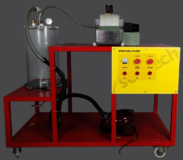
Sci-tech Drum Cell Filters Model FM 118 can be used to separate solids continuously from suspensions. The suspension unit produces a suspension of diatomite and water. A pump conveys the suspension into the suspension tank of the drum cell fil [...]
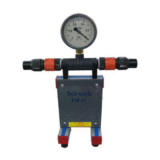
Sci-tech Depression Measurement Vacuum Pressure Gauge FM 37 is an anodized aluminum structure that supports a vacuum gauge whose reading gives us the measurement. Two quick connections at both sides of the vacuum gauge allow connecting reinfor [...]


